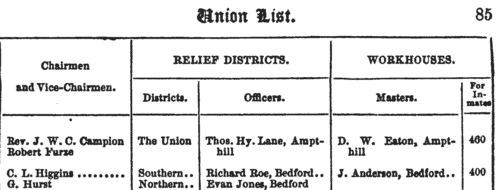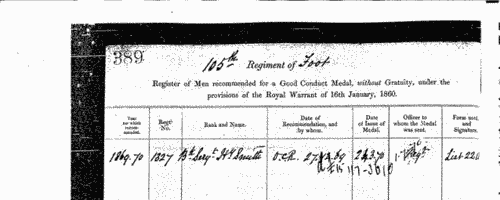Daley Surname Ancestry ResultsOur indexes 1000-1999 include entries for the spelling 'daley'. In the period you have requested, we have the following 259 records (displaying 101 to 110): Single Surname Subscription | | | Buying all 259 results of this search individually would cost £1,616.00. But you can have free access to all 259 records for a year, to view, to save and print, for £100. Save £1,516.00. More... |
These sample scans are from the original record. You will get scans of the full pages or articles where the surname you searched for has been found. Your web browser may prevent the sample windows from opening; in this case please change your browser settings to allow pop-up windows from this site.  British riflemen fighting in China
(1860) British riflemen fighting in China
(1860)
The China Medal was awarded to soldiers and sailors who took part in the prosecution of the war against the Chinese from 1856 to 1860. Separate clasps were awarded for men who had been in receipt of the China Medal of 1842; for being actually present at Canton on 28 and 29 December 1857, when that city was bombarded and finally captured; for being actually engaged in the operations which ceased with the first capture of the Taku Forts, 20 May 1858, and led to the Treaty of Tientsin; for being actually present at the capture of the Taku Forts 21 August 1860; and for being actually present before Pekin the day the gate of that city was given up to the allied (British and French) army, viz. on 13 October 1860. The 2nd battalion, the 60th (The King's Royal Rifle Corps) Regiment, based in Winchester, embarked for the Cape of Good Hope in June 1851, and after taking part in the Kaffir War, was moved to India, where it helped deal with the Mutiny. In 1860 the battalion was transferred to China. The regiment took part in the capture of the Taku Forts and that of Pekin.DALEY. Cost: £8.00.  | Sample scan, click to enlarge

|  Sailors and marines on board Her Majesty's ship Snake
(1860) Sailors and marines on board Her Majesty's ship Snake
(1860)
The China Medal was awarded to soldiers and sailors involved in the various actions of the war against China, in which this ship was engaged in 1860. The medals were either delivered on board or sent on in 1862: except that many of the men were no longer immediately traceable, and the remarks on the roll show that some medals were not sent on for several years, and some were never sent.DALEY. Cost: £8.00.  | Sample scan, click to enlarge

|  Sailors on board Her Majesty's gunboat Havoc
(1860) Sailors on board Her Majesty's gunboat Havoc
(1860)
The China Medal was awarded to soldiers and sailors involved in the various actions of the war against China, in which this ship was engaged in 1860. The medals were either delivered on board or sent on in 1862: except that many of the men were no longer immediately traceable, and the remarks on the roll show that some medals were not sent on for several years, and some were never sent. After the main roll there is a section showing which of the men also qualified for clasps. Separate clasps were awarded for men who had been in receipt of the China Medal of 1842; for the taking of Fatshan in 1857, Canton in 1857, Taku Forts in 1858, Taku Forts in 1860, and Pekin in 1860. Most of the men on this boat are shown as having been given the Taku Forts 1860 clasp, for being actually present at the capture of the Taku Forts 21 August 1860.DALEY. Cost: £8.00.  | Sample scan, click to enlarge

| Long-stay Paupers in Workhouses: Greenwich
(1861)
This comprehensive return by the Poor Law Board for England and Wales in July 1861 revealed that of the 67,800 paupers aged 16 or over, exclusive of vagrants, then in the Board's workhouses, 14,216 (6,569 men, 7,647 women) had been inmates for a continuous period of five years and upwards. The return lists all these long-stay inmates from each of the 626 workhouses that had been existence for five years and more, giving full name; the amount of time that each had been in the workhouse (years and months); the reason assigned why the pauper in each case was unable to sustain himself or herself; and whether or not the pauper had been brought up in a district or workhouse school (very few had). The commonest reasons given for this long stay in the workhouse were: old age and infirm (3,331); infirm (2,565); idiot (1,565); weak mind (1,026); imbecile (997); and illness (493). DALEY. Cost: £6.00.  | Sample scan, click to enlarge

| Long-stay Paupers in Workhouses: Stepney
(1861)
This comprehensive return by the Poor Law Board for England and Wales in July 1861 revealed that of the 67,800 paupers aged 16 or over, exclusive of vagrants, then in the Board's workhouses, 14,216 (6,569 men, 7,647 women) had been inmates for a continuous period of five years and upwards. The return lists all these long-stay inmates from each of the 626 workhouses that had been existence for five years and more, giving full name; the amount of time that each had been in the workhouse (years and months); the reason assigned why the pauper in each case was unable to sustain himself or herself; and whether or not the pauper had been brought up in a district or workhouse school (very few had). The commonest reasons given for this long stay in the workhouse were: old age and infirm (3,331); infirm (2,565); idiot (1,565); weak mind (1,026); imbecile (997); and illness (493). DALEY. Cost: £6.00.  | Sample scan, click to enlarge

| Masters of Workhouses: Lancashire
(1863)
Most Poor Law Unions maintained a workhouse. The Union List for 1863, arranged by counties and unions, and spread across facing pages, gives in the final columns the names of the masters of each workhouse, and the number of inmates. This number is the number fixed by the Poor Law Board. A few related institutions - Houses of Industry for Out-door Poor, Industrial Schools, Houses of Recovery, &c., are also included, and there are also some masters of workhouses outside the Poor Law Union system maintained by parishes under local acts, and in Gilbert's Incorporations. All the masters and matrons are included in this index.DALEY. Cost: £6.00.  | Sample scan, click to enlarge

| Victoria Intestates
(1865)
The probate courts of the Australian colonies furnished returns of estates of deceased intestates, giving full name, colonial residence, amount of the estate and how much had been disbursed and how. The date of death is often stated, and if by accident, suicide or crime. Names were carried forward from return to return until the estate was expended or exhausted. DALEY. Cost: £6.00.  | Sample scan, click to enlarge

| Unclaimed Money and Property
(1866)
Gun & Co. of 17 Charlotte Street, and later of 6 Prince of Wales' Road, London, in about 1866 published this second 'List of Next of Kin & Heirs, &c., who have been Advertised for in the English, Irish, Scotch, United States of America, Canadian, Australian, East and West Indian, and other Newspapers, since 1704. Money & Property to the value of many Millions Sterling want Claimants'. The list of 4,128 names gives surname, christian name, and, occasionally, locality. Copies of the actual advertisements were furnished to enquirers by the company at a cost of six shillings. DALEY. Cost: £4.00.  | Sample scan, click to enlarge

| Stockton-on-Tees Voters: Stockton Polling District
(1868)
This poll book for the First Parliamentary Election for the Borough of Stockton-on-Tees lists the voters alphabetically by polling district, with full name (surname first) and address. In the right-hand column D represents the Liberal candidate, Joseph Dodds, Esq., and V the Conservative, Lord Ernest Vane Tempest. The three polling districts were Norton, Stockton (including so much of Linthorpe as lay within the parliamentary borough of Stockton), and Thurnaby. At the end of each district the handful of lodger voters are listed separately.DALEY. Cost: £4.00.  | Sample scan, click to enlarge

|  Outstanding soldiers of the 1st regiment of Foot
(1860-1870) Outstanding soldiers of the 1st regiment of Foot
(1860-1870)
The 1st (The Royal, or Royal Scots) Regiment of Foot was in two battalions. The 1st battalion, having returned from the Crimea, embarked for India in 1857, where they were based at Secunderabad. The home depot was at Colchester. The second battalion was based at Birr in Ireland, but was sent abroad in 1853, and by 1860 was serving in China. Each year just a handful of outstanding soldiers of the regiment were chosen for good conduct medals and gratuities: these are listed here. There were two lists, one for men recommended for the Good Conduct Medal without a gratuity, and one for gratuities - £5 to a private, £10 to a corporal, and £15 to a serjeant. Both lists are indexed here, and each gives rank, name, regimental number, date of recommendation and date of issue. (The sample scan is from the 105th foot)DALEY. Cost: £8.00.  | Sample scan, click to enlarge

|
Research your ancestry, family history, genealogy and one-name study by direct access to original records and archives indexed by surname.
|













